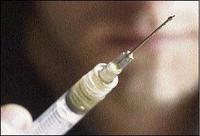Keisha Shakespeare-Blackmore, Staff Reporter
DR Paul Sudhir, professor of pathology at The University of Texas Medical School in Houston, and his colleagues, think they might have found a potential preventative human immunovirus (HIV) vaccine, they disclose to The Sunday Gleaner in an exclusive interview.
Sudhir says this team is making headway in its research and is ready to begin testing its theory.
"If all goes well, we are looking at a minimum of five years, if necessary, just to go through the regulatory hurdles to get the medical trials, which consist of three applications," he says.
The first application is to study the safety of the project.
"After we have injected the drug in the body of about eight-15 patients who are already infected, (if that goes well), then the goal is to reduce the virus and hopefully, remove it all together."
The second application is using microbicide. This is inserting the vaccine through the vagina or rectum to prevent the disease. The final application is to get the immune system to produce the abzyme on it own.
Short-term goal
"We will achieve this by taking a small portion of [a] chemically modified HIV and administer it to uninfected people who are at higher risk of contracting the virus. These include sex workers, those who have unprotected sex, and intravenous drug users. This will be administered much like the vaccine for small pox and others," the doctor explains.
He said the short-term goal is to give HIV-positive individuals the vaccine. This applies to the 10-15 per cent of those who have developed resistance to the available drugs.
"If our tests work, then it will replace the drugs on the market and hopefully, will not be as expensive. But the ultimate is to eradicate the virus altogether."
In 1989, Sudhir and his group discovered abzymes, which are antibodies with enzymatic (chemi-cally reactive) capabilities that can attack the weakness in the HIV. The weak spot is hidden in the envelope protein gp120. This protein allows the HIV to attach itself to host cells in the body that leads to infection and eventually to acquired immunodeficiency syndrome (AIDS).
According to Sudhir, the HIV is constantly mutating, but it also needs one region that remains constant to attach to cells. If this region changes, then the virus can infect cells. He said the beauty about abzymes is that they recognise all the forms of the HIV across the world, and they can break down and inactivate thousands of virus particles.
He said that they found the weakness by means of serendipity; chance favours the prepared mind. He notes that they have been looking for something, like abzymes, to occur, and once it did, they knew what they would do with it.
He tells The Sunday Gleaner that in 1995, he and his group decided to develop abzymes for both therapy and vaccination. He said they are derived from two sources: individuals with the autoimmune disease, lupus, and those who have lived for over two decades with the HIV, but have not developed AIDS.
"Lupus rarely co-existed with HIV, so lupus patients appear to be protected against HIV infection. Thus, we have engineered abzymes from lupus patients using a certain modern engineering biological method so that we have a renewable and constant source all the time for therapy," says Sudhir.
Reverse the course
However, he points out that lupus patients produce a small amount of these abzymes in their blood and as such, they have engineered these abzymes by cloning them from lupus patients. According to Sudhir, what makes the abzymes so lethal is that the HIV infects immune cells called T-cells. The virus also destroys the ability of these cells to defend us against microbial diseases. Usually, we use our T-cells to fight against these diseases.
He explains that if their research works, the vaccine would reverse the course of the disease in people with full-blown AIDS. However, there will be some rehabilitation of the immune system that might be irreversible, because the virus destroys the immune system. "But certainly, the disease will not progress further."

